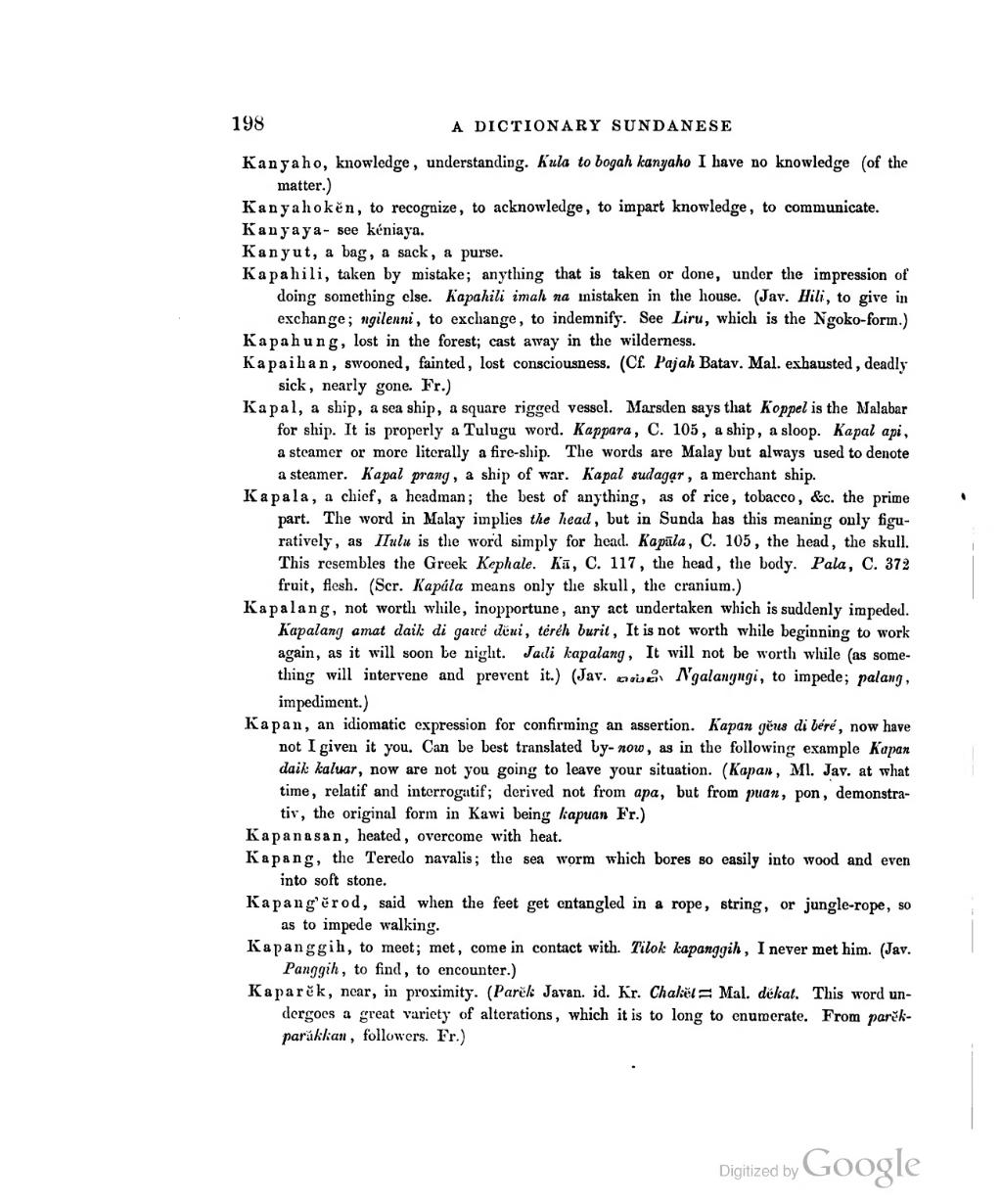Kanyaho, knowledge, understanding. Kula to bogah kanyaho have no knowledge (of the matter.)
Kanyahokĕn, to recognize, to acknowledge, to impart knowledge, to communicate.
Kanyanya- see kéniaya.
Kanyut, a bag, a sack, a purse.
Kapahili, taken by mistake; anything that is taken or done, under the impression of doing something else. Kapahili imah na mistaken in the house. (Jaw Hili, to give in exchange; ngilenni, to exchange, to indemnify. See Liru, which is the Ngoko-form.)
Kapahung, lost in the forest; cast away in the wilderness.
Kapaihan, swooned, fainted, lost consciousness. (Cf. Pajah Batav. Mal. exhausted , deadly sick, nearly gone. Fr.)
Kapal, a ship, a sea ship, a square rigged vessel. Marsden says that Koppel is the Malabar for ship. It is properly a Tulugu word. Kappara, C. 105, a ship, a sloop. Kapal api, a steamer or more literally a fire-ship. The words are Malay but always used to denote a steamer. Kapal prang, a ship of war. Kapal sudagạr, a merchant ship.
Kapala, a chief, a headman; the best of anything, as of rice, tobacco, &c. the prime part. The word in Malay implies the head, but in Sunda has this meaning only figuratively, as Hulu is the word simply for head. Kapāla, C. 105, the head, the skull. This resembles the Greek Kephale. Kā, C. 117, the head, the body. Pala, C. 372 fruit, flesh. (Scr. Kapála means only the skull, the cranium.)
Kapalang, not worth while, inopportune, any act undertaken which is suddenly impeded. Kapalang amat daik di gawé dĕui, téréh burit , It is not worth while beginning to work again, as it will soon be night. Jadi kapalang. It will not be worth while (as something will intervene and prevent it.) (Jav. (![]() Javanese characters) Ngalangngi, to impede; palang , impediment.)
Javanese characters) Ngalangngi, to impede; palang , impediment.)
Kapan, an idiomatic expression for confirming an assertion. Kapan gĕus di béré, now have not I given it you. Can be best translated by-now, as in the following example Kapan daik kaluar, now are not you going to leave your situation. (Kapan, Ml. Jav. at what time, relatif and interrogatif; derived not from apa, but from puan, pon, demonstrativ, the original form in Kawi being Kapuan Fr.)
Kapanasan, heated, overcome with heat.
Kapang, the Teredo navalis; the sea worm which bores so easily into wood and even into soft stone.
Kapang'êrod, said when the feet get entangled in a rope, string, or jungle-rope, so as to impede walking.
Kapanggih, to meet; met, come in contact with. Tilok kapanggih, I never met him. (Jav. Panggih, to find, to encounter.)
Kaparĕk, near, in proximity. (Parĕk Javan. id. Kr. Chakĕt = Mal. dĕkat. This word undergoes a great variety of alterations, which it is to long to enumerate. From parĕk-parĕkkan, followers. Fr.)

